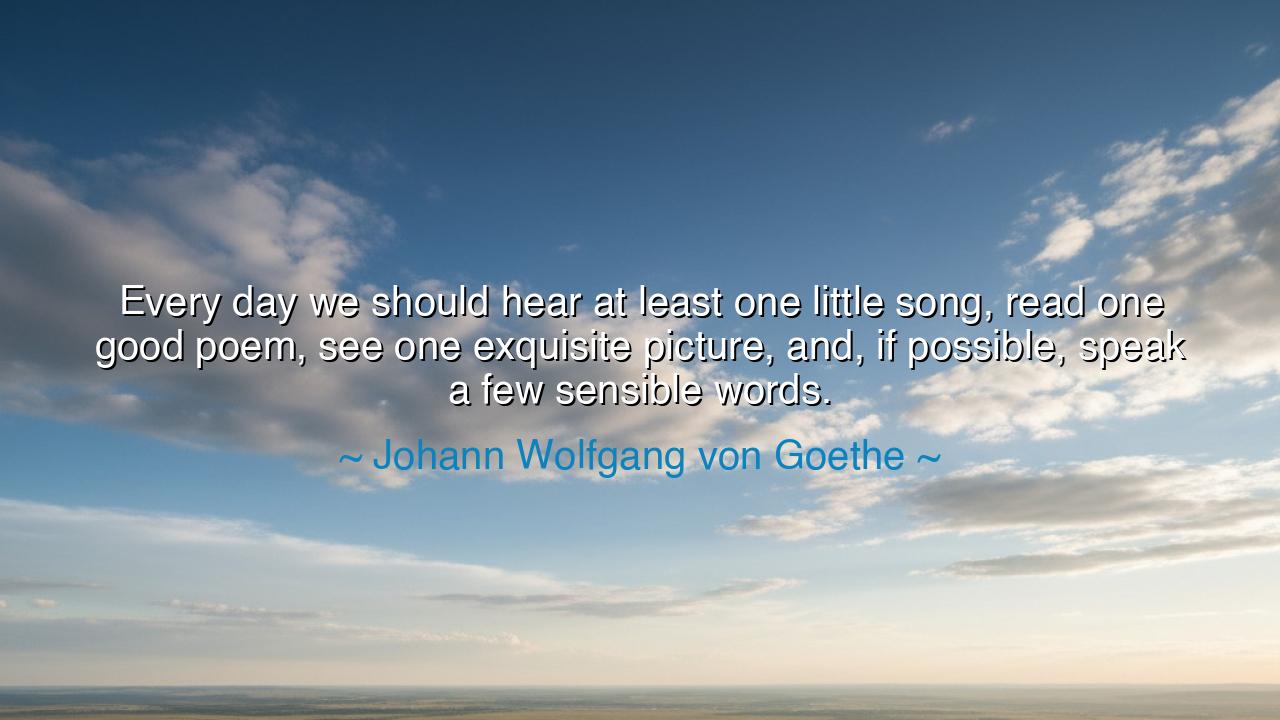
Every day we should hear at least one little song, read one good
Every day we should hear at least one little song, read one good poem, see one exquisite picture, and, if possible, speak a few sensible words.






“Every day we should hear at least one little song, read one good poem, see one exquisite picture, and, if possible, speak a few sensible words.”
Thus wrote Johann Wolfgang von Goethe, the great German poet, philosopher, and sage of human spirit. These words, simple yet profound, are not a mere prescription for pleasure — they are a creed for the soul, a daily ritual of awakening. Goethe, who lived between the worlds of reason and art, science and imagination, understood that man must nourish not only his body but his inner life — the realm of thought, beauty, and meaning. His counsel is a call to live each day not as a burden to be endured, but as a work of art to be completed.
Goethe’s life was a symphony of curiosity. He studied law and botany, wrote poetry and plays, explored anatomy, and even delved into color theory. Yet amid all his learning and discovery, he never lost sight of the spiritual necessity of beauty. He believed that art and thought are food for the spirit, as bread and water are for the body. In this quote, he reminds us that the soul thrives on beauty — on music that stirs the heart, on poetry that awakens thought, on art that teaches us to see. Without these, a man may live, but he will not truly live.
To hear a little song each day is to let harmony enter the soul. Music — even the simplest melody — can quiet the mind and lift the heart beyond its weariness. The ancients understood this well. In Greece, Pythagoras taught that the planets themselves made music as they moved, a celestial rhythm that kept the universe in order. Likewise, Goethe knew that when we open our hearts to melody, we align ourselves with that same cosmic harmony. One song — a single note of beauty — can remind us that the world, despite its turmoil, still sings.
To read a good poem is to speak with eternity. Poetry, said Goethe, is the distillation of truth — it captures the infinite in a few lines, the divine in the human voice. It teaches us to feel deeply and to think clearly. Consider how a poem like Wordsworth’s “I Wandered Lonely as a Cloud” can transform an ordinary walk into a revelation, or how Rumi’s verses awaken the longing for the divine. A poem, read with attention, opens a window within the heart, through which light enters — the light of understanding and of presence.
To see one exquisite picture each day is to train the eye to recognize beauty, not only in art but in life itself. Goethe, who studied the nature of color and form, knew that vision shapes the soul. The man who learns to see beauty in a painting will one day see it in the sunrise, the human face, the humble street. Beauty refines the spirit, teaching it patience, gratitude, and wonder. When we surround ourselves with what is noble and harmonious, we are lifted toward nobility ourselves.
And lastly, Goethe bids us to speak a few sensible words — not clever, not grand, but sensible: words that bring peace, kindness, or understanding. For wisdom is not only found in art or philosophy, but in the way we speak to one another. A single word, spoken in truth, can heal a heart. A gentle sentence can change the course of a day. Goethe reminds us that thought and beauty mean little if they do not shape our conduct and our conversation. To live beautifully is also to speak wisely.
The lesson, then, is this: each day is an opportunity to feed the soul. The world tempts us to hurry, to chase, to forget — but Goethe calls us back to stillness and depth. Hear a song, and remember joy. Read a poem, and remember truth. See a picture, and remember beauty. Speak wisely, and remember compassion. In these small acts lies a great art — the art of living fully, awake to both the visible and the invisible. For the man who cultivates beauty within himself becomes, in turn, a source of beauty to others.
So, my child of thought and time, take this teaching to heart. Begin each day not with haste, but with reverence. Let music, poetry, and art be your companions; let your words be measured and kind. Do this, and you will not merely pass through your days — you will inhabit them, filling them with grace and meaning. For as Goethe knew well, the secret of a life well-lived is not in grand triumphs, but in the daily nourishment of the soul. Thus, by small and steady acts of beauty, wisdom, and love, you shall become — quietly and surely — free.






AAdministratorAdministrator
Welcome, honored guests. Please leave a comment, we will respond soon